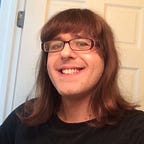Between Fear and Bravery: Being Queer in a Small Town
Content Warning: Transphobia Homophobia
Two strangers pass each other in Target. One is an old man pushing a shopping cart, and the other is wearing Revlon candy-apple lip butter, a black t-shirt that says “Proud to be Genderqueer and Bi,” baby blue nail polish, women’s capris, and women’s flip-flops. The two exchange glances. The old man keeps looking, not knowing what to say, while the other looks back and thinks two things: “That’s right, go ahead and say something” and “please don’t stare at me, sir.”
That sums up being a bisexual AMAB genderqueer person living in a small town. I walk the line between being out and proud, and secretly wishing to run back inside the closet. Some days I want to walk down the street yelling: “Ask me about my pronouns!” Other days I just want to say: “Um, I just want to use this gender-neutral bathroom and go home.”
Despite all the recent progress made towards transgender equality in my home state of Maryland — the Fairness for All Marylanders Act of 2014 and the more recent transgender birth certificate law — it’s still hard for me to be an out and open queer person. Maryland is considered a blue state, but there are some areas that are quite red. For example, I live in a small town in Maryland’s Eastern Shore region. It’s a beautiful town full of art, culture and probably the best coffee shop in the world. And yet it’s still a small town, so when it comes to LGBTQ equality, the general attitude around here is: “I’m okay with it as long as I don’t have to see it.” Hence, the LGBTQ community is almost underground around here.
As Steven Petrow wrote about a year ago, even with same-sex marriage legal in all fifty states, people still freak out when same-gender couples kiss in public, while different-gender couples can make out wherever they want. Straight people think we’re “shoving it in their faces” when we’re out and open, and my little corner of the world is no different. When I first came out as bisexual and started dating my first boyfriend, we had to be careful where we were if we wanted to kiss. In fact, one time we were kissing in my car in a parking lot, and I saw a man in a truck a few spaces away looking in our direction. I thought he would eventually get out of the truck and beat us up, but he eventually drove away. It was a rude reminder that even though my family and friends were supportive, I was still the Other.
Along with the idea that being queer is okay as long as you “don’t shove it in people’s faces”, our society has this idea that being transgender is okay as long as you “pass.” As Alok Vaid-Menon once wrote for the Guardian: “[This] is part of a larger system of gender binarism that requires us to assimilate into discrete categories of ‘man’ or ‘woman’ to be worthy of recognition and safety.” I understand that passing is crucial for transgender people’s survival, but I still don’t understand what passing means for someone genderqueer, like me. I don’t feel the need to take hormones or undergo surgery; presenting as feminine is enough to ease my gender dysphoria. Even then, people still read me as a guy, so whenever I shop in the women’s section, I keep looking over my shoulder to make sure a sales associate isn’t on their walkie-talkie saying: “We’ve got a pervert in the women’s section.”
Maybe I’m just being paranoid, but because I hear so many horror stories about my queer siblings — from being fired for being queer, to bathroom harassment, to murder — at least once a day I wonder if I’m next. And I shouldn’t have to. The worst thing I’m doing is challenging people’s preconceived notions about gender and sexuality. But that’s how bigotry works, it doesn’t like new and novel ideas. It clings to outdated dogma and superstitions with its fingernails, and refuses to let go.
Before anyone writes me off as a “professional victim”, though, I’m far from paralyzed by my fear. In fact, my fear fuels my activism. I recently became involved with the local PFLAG chapter. Every saturday we set up a table at the local farmers’ market to let people know our organization exists. Surprisingly most people have been really supportive of us.
In fact, we usually add two or three new names to our email list every saturday. Our organization may be small, but it’s growing.
Since I live between the sexual and gender binaries, it only makes sense that my life as a bisexual genderqueer person in a small rural town is a life between fear and bravery. In fact, my fear and bravery are like conjoined twins forever linked together at the hip. They light the fire under each other’s ass; I’m brave because I’m afraid, and I’m afraid because I’m brave. And I think I might not be alone.
advertisement
Trav Mamone is a genderqueer bisexual Humanist writer based in Easton, MD. They are a regular contributor to Queereka.com, blog at freethoughtblogs.com/bianymeans, and host the Bi Any Means Podcast.
Originally published at bitopia.org.
